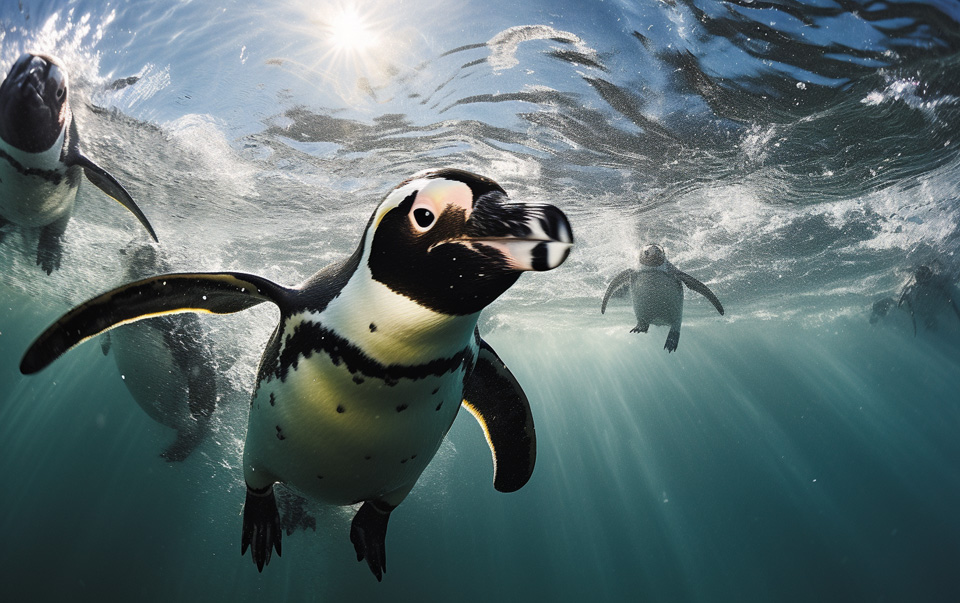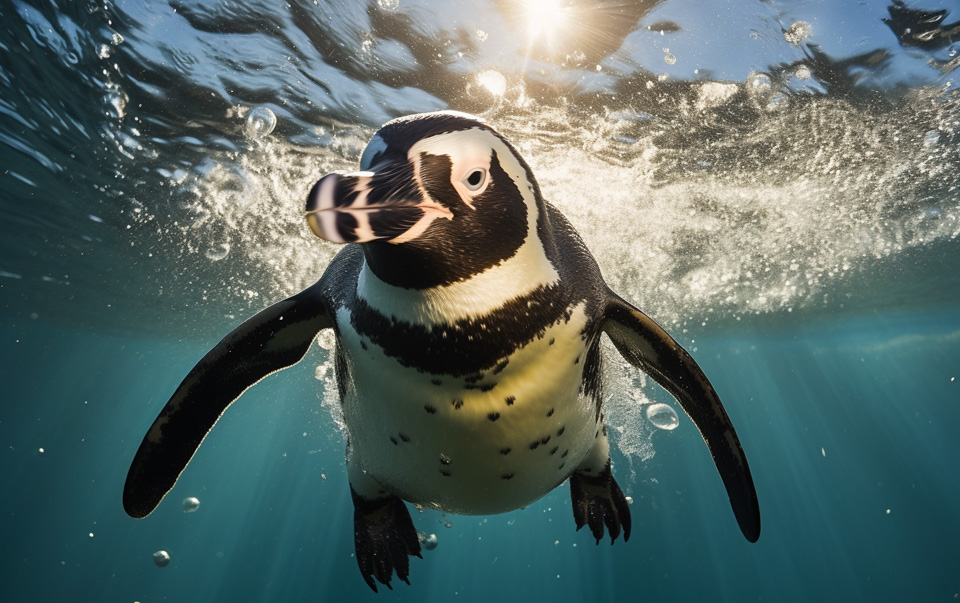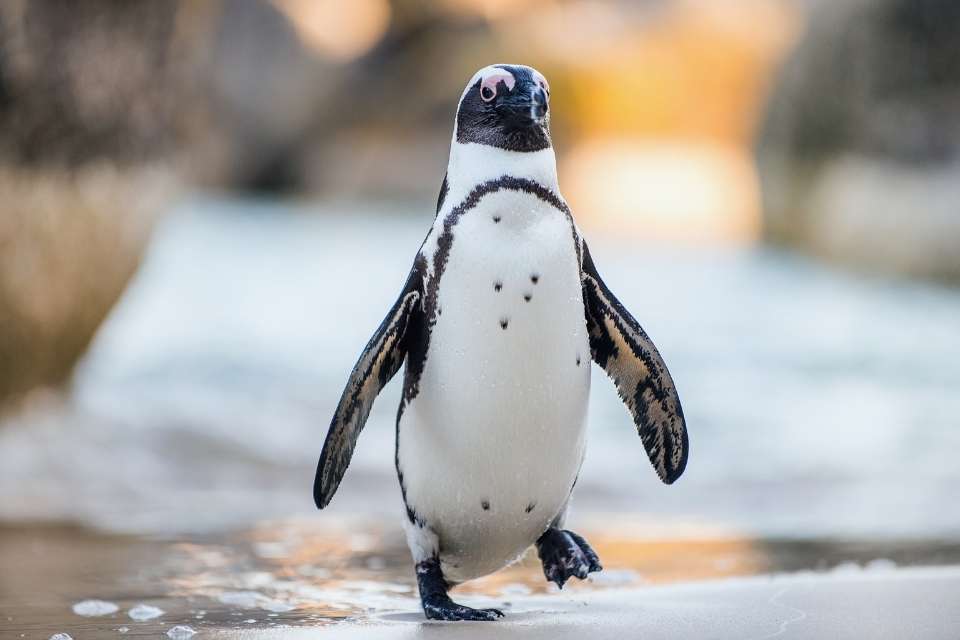Welcome to our article on penguins and their fascinating relationship with water. Today, we’ll address some of the most common questions about penguins and their aquatic lifestyle. You may be wondering, can penguins drown?
Recently, a study revealed a concerning trend. Thousands of baby emperor penguins drowned due to the early breakup of sea ice caused by warming seas in Antarctica. This unfortunate event highlights the vulnerability of penguins to environmental changes, particularly climate change.
While it is extremely rare for penguins to drown, this incident underscores the importance of understanding their interactions with water and the risks they face.
Key Takeaways:
- Penguins typically do not drown, but rare instances and environmental factors contribute to their vulnerability.
- Penguins are excellent swimmers, equipped with streamlined bodies, webbed feet, and strong flippers.
- They cannot breathe underwater and require air, but their adaptations allow them to hold their breath and extract oxygen efficiently.
- Penguins are highly adapted for survival in aquatic environments, with waterproof feathers and insulating blubber.
- While penguins can float, their natural habitat is in the water, where they can thrive and survive.
Now that we’ve answered the question of whether penguins can drown, let’s delve deeper into their aquatic abilities and how they navigate the waters.
Remember, understanding these remarkable creatures is key to conserving their habitats and ensuring their survival.
Stay tuned for the next sections where we’ll explore their swimming skills, breathing adaptations, and overall ability to thrive in water.
Can Penguins Swim?

Penguins are known for their exceptional swimming abilities. They are expert swimmers who spend the majority of their lives gliding through the water.
With their streamlined bodies, webbed feet, and strong flippers, penguins can effortlessly navigate the depths. They possess the skills to swim at impressive speeds of up to 15 miles per hour and plunge to astonishing depths of over 1,700 feet.
These incredible swimming talents enable penguins to pursue and capture their prey, such as fish, to sustain themselves.
Penguins are truly remarkable creatures of the sea, gracefully gliding through the waves as they propel themselves forward. Their sleek bodies and perfectly evolved adaptations make them some of the best swimmers in the animal kingdom.
Whether they are swimming in harmony or diving deep into the ocean, penguins showcase their agility and finesse in the water.
Can Penguins Breathe Underwater?
Contrary to popular belief, penguins are not capable of breathing underwater. Like all birds, they have lungs and need to come to the surface to breathe. However, penguins have developed unique adaptations that allow them to stay submerged for extended periods of time.
One of these adaptations is their ability to hold their breath while underwater. Penguins can hold their breath for several minutes, enabling them to dive deep into the water in search of food. This remarkable breath-holding capacity is crucial for their survival in their marine habitats.
Another fascinating adaptation of penguins is their ability to extract oxygen from the air trapped in their feathers. This air acts as a kind of buoyancy aid while swimming and helps them stay afloat effortlessly. It’s almost like having a portable oxygen supply built into their bodies!
“Penguins may not be able to breathe underwater, but their unique adaptations make them exceptional divers and hunters.” – Marine Biologist Sarah Thompson
So, while penguins cannot breathe underwater, they have evolved remarkable strategies to thrive in their aquatic environment. These adaptations allow them to dive, swim, and search for food below the surface, making them highly skilled underwater predators.
- Contrary to popular belief, penguins cannot breathe underwater.
- Penguins have adaptations that enable them to stay submerged for extended periods of time.
- They can hold their breath for several minutes while diving for food.
- Penguins extract oxygen from the air trapped in their feathers, aiding buoyancy.
So the next time you marvel at a penguin’s graceful underwater movements, remember that they may not be breathing underwater, but they have certainly mastered the art of surviving and thriving in their marine world.
Can Penguins Survive in Water?
Penguins are well adapted to survive in water. Their waterproof feathers and layer of insulating blubber help to keep them warm in the cold ocean waters. These unique adaptations protect them from the low temperatures and enable them to withstand harsh conditions.
Additionally, penguins have a specialized circulatory system that allows their extremities to stay warm even in frigid waters. This adaptation ensures that they can continue swimming and diving without losing essential body heat.
Penguins rely on their exceptional swimming and diving abilities to find food, evade predators, and navigate their ocean habitats. Their streamlined bodies, webbed feet, and strong flippers are perfectly designed for efficient movement in the water.
They are highly skilled divers and can reach impressive depths in search of prey. By utilizing their natural buoyancy and strong underwater swimming skills, penguins can dive to great depths and stay submerged for extended periods of time.
In conclusion, penguins are not only excellent swimmers but also fully capable of surviving in water. Their adaptation to marine environments has allowed them to thrive and dominate in their ocean habitats. Penguins truly are remarkable creatures, perfectly suited for life in the water.
Do Penguins Float?
Penguins, those adorable semi-aquatic birds, have a natural buoyancy that allows them to float effortlessly on the surface of the water.
Their dense bones and tight feathers work together to keep them afloat, providing them with the ability to rest and conserve energy while still remaining in the water.
However, floating is not the primary mode of transportation for penguins. These skilled swimmers and divers prefer to swim beneath the water’s surface, using their streamlined bodies and webbed feet to navigate with precision.
Diving deep into the ocean, penguins can explore depths of over 1,700 feet in search of food.
“Floating is typically a resting position for penguins, allowing them to take a break from their active swimming and diving behavior,” explains Dr. Jane Wilson, a marine biologist at the South African Penguin Conservation Society. “It’s their way of taking a breather while still staying in their natural element.”
In addition to conserving energy, floating on the water’s surface enables penguins to socialize with other members of their colony and engage in courtship displays.
It’s during these moments of stillness that they can bond with their mates and communicate through a range of vocalizations.
The Wonders of Penguin Adaptations
The ability to float is just one of many remarkable adaptations that penguins have developed over time. Their unique physiology, including their streamlined bodies and strong flippers, allows them to navigate the water with agility and speed.
Penguins’ tight feathers not only keep them dry but also aid in buoyancy. These water-resistant feathers act as a natural wetsuit, trapping a layer of air close to the skin. This air provides additional buoyancy, making it easier for penguins to float effortlessly on the water’s surface.
“The unique combination of dense bones, tight feathers, and their streamlined physique allows penguins to strike a delicate balance between buoyancy and agility,” says Dr. Wilson. “It’s truly fascinating how these adaptations have enabled penguins to thrive in their aquatic environment.”
Conclusion
In conclusion, penguins are extraordinary creatures that have adapted to thrive in water. Their streamlined bodies, webbed feet, and strong flippers make them exceptional swimmers.
While it is extremely rare for penguins to drown, the increasing impact of climate change and human disturbances pose risks to their survival.
Penguins are highly specialized for life in the water. They can hold their breath and dive to great depths in search of food, showcasing their impressive diving abilities.
Floating on the surface is typically a resting position for penguins, but their natural habitat is the ocean where they can truly flourish.
As climate change continues to heat the seas and disrupt penguin habitats, it is crucial for us to prioritize conservation efforts to protect these incredible creatures.
By ensuring the preservation of their environment and reducing our carbon footprint, we can safeguard the future of penguins and other marine species.
FAQ
Can penguins drown?
While it is extremely rare for penguins to drown, climate change and human disturbances can pose risks to their survival. Penguins are well adapted for life in the water, with streamlined bodies, webbed feet, and strong flippers.
Can penguins swim?
Penguins are known for their swimming abilities. They are adept swimmers and spend a majority of their lives in water.
Can penguins breathe underwater?
No, penguins cannot breathe underwater. Like all birds, penguins have lungs and need to come to the surface to breathe. However, they have developed adaptations that allow them to stay submerged for extended periods of time.
Can penguins survive in water?
Yes, penguins are well adapted to survive in water. Their waterproof feathers and layer of insulating blubber help to keep them warm in cold ocean waters. They also have a unique circulatory system that allows their extremities to stay warm while diving in cold water.
Do penguins float?
Penguins have a natural buoyancy that allows them to float on the surface of the water. However, they generally prefer to swim and dive rather than float. Floating is typically a resting position for penguins, allowing them to conserve energy while still remaining in the water.
Do penguins need water to survive?
Yes, penguins rely on water for their survival. They are highly specialized for life in the water and have evolved to thrive in marine environments. Penguins use water to find food, evade predators, and navigate their ocean habitats.


